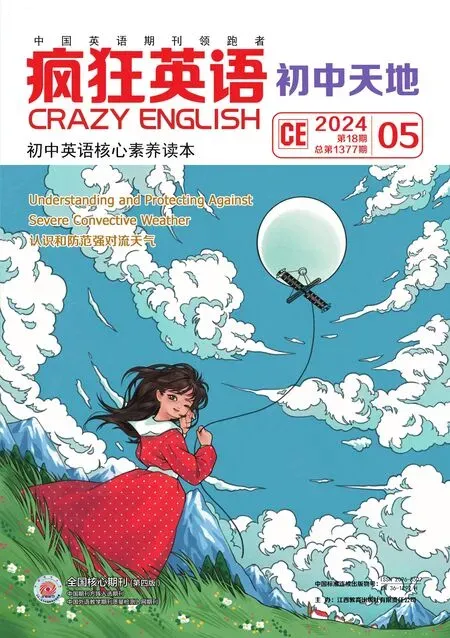易混动词辨析及动词短语归纳
◎王桂馨
易混动词辨析
1.take、bring 与carry 的区别
take 指将某物或某人从这里“带到”或“拿到”某处。
如:Could you take it to the classroom?你能把它带到教室吗?
bring 与take 相反,指将某物或某人从别处“带来”或“拿来”。
如:May I bring Tom to see you next Monday?下周一我可以带汤姆来见你吗?
carry 指随身携带(背着、扛着、提着、抱着),不表明来去的方向。
如:The box is heavy.Can you carry it?盒子太重了。你搬得动吗?
2.find、look for 与find out 的区别
find 的意思是“找到”,look for 是“寻找”,find out 是经过调查“发现、查明(真相)”。
如:I can’t find my pen.我找不到我的钢笔了。
He is looking for his cat.他正在寻找他的猫。
Can you find out who broke the window?你能查明是谁打破了窗户吗?
3.forget 与leave 的区别
这两个词都有“忘”的意思,其区别如下:forget常表示“记不起”“忘了要带(买)”,leave 表示“把某物忘(丢)在某地”。
如:I forget his name.我忘记他的名字了。
He left his gloves on the train.他把他的手套忘在火车上了。
4.hear 与listen to 的区别
hear 与listen to 都有“听”的意思,其区别如下:hear 常表示“听见;听到”,listen to 常表示“倾听(集中注意力去听)”。
如:We heard somebody knocking at the door.我们听到有人在敲门。
He is listening to the music now.现在他正在听音乐。
5.borrow、lend 与keep 的区别
borrow、lend、keep 都可以表示“借”的意思,其区别如下:borrow 指借入,表示“向某人借某物”用borrow...from...;lend 指借出,表示“把某物借给某人”用lend...to...;borrow 和lend 都是短暂性动词。因此,表示借多久,要用keep。
如:I borrowed a bike from him.我从他那借了一辆自行车。
Don’t lend it to others.不要把它借给别人。
You can keep this book for two weeks.这本书你可以借两周。
6.look、see 与watch 的区别
从意义上来分,look 是“看”,表示看得见;see 是“看见”;watch 是“观看;注视”。
如:Look at the picture.看看这幅图。
It was dark in the room.We could see nothing.房间里很黑。我们什么也看不见。
I’m going to watch the football game this evening.今晚我将观看足球赛。
7.reach、arrive 与get to 的区别
reach、arrive 和get to 都表示“到达”。reach 是及物动词,后面直接跟表示地点的名词作宾语。arrive 是不及物动词,后面要用介词in或at 放在表示地点的宾语之前(较大的城市或地区用in,较小的地方用at)。get to 一般多用于口语中。
如:We reached the top of the hill at last.我们最终到达了山顶。
They arrived in Beijing last week.他们上周到达北京。
I get to school at about 7:30 every day.我每天大约7:30到学校。
8.speak、say、talk 与tell 的区别
speak、say 和talk 都含有“说、讲、说话”的意思。speak 常常用来指人们对语言的掌握或使用,不强调说话的内容。say 一般用作及物动词,着重指说话的内容,而且后面常常带有直接或间接引语。talk 一般用作不及物动词,着重指连续地说话或与人交谈。tell 的意思是“讲述;吩咐”。
如:They speak English and French.他们说英语和法语。
Jim often say hello to me.吉姆经常向我问好。
I shall talk to your father about your health.我将和你的爸爸谈论你的健康问题。
He is telling an interesting story.他正在讲一个有趣的故事。
9.spend、cost、take 与pay 的区别
spend 的主语是人,其结构是“人+spend+时间或金钱+(in)doing sth”或“人+spend+时间或金钱+on sth”。cost 的主语是物,其结构是“物+cost+人+金钱”。take 的主语是物,其结构是“It+takes+人+时间+to do sth”。pay 的主语是人,其结构是“人+pay+金钱+for sth”。
如:I spent an hour watching TV just now.刚才我花了一个小时看电视。
The book cost me tenyuan.那本书花了我10 元钱。
It takes me an hour to play football every day.我每天花一个小时踢足球。
I paid two hundredyuanfor this new watch.我花200 元买了这块新手表。
10.stop to do sth 与stop doing sth 的区别
stop to do sth 意为“停止正在做的事情,去做另外一件事情”。stop doing sth 意为“停止正在做的事情”。
如:They stopped to talk with their teacher.他们停下来与他们的老师交谈。
They stopped talking with their teacher.他们停止和他们的老师交谈。
11.wear 与put on 的区别
wear 是“穿着;戴着”的意思,重点表示状态。put on 是“穿上;戴上”的意思,强调动作。
如:Lucy is wearing blue trousers today.露西今天穿着蓝裤子。
He is putting on his red coat.他正在穿他的红色外套。
12.wish 与hope 的区别
wish 和hope 都可表示“希望”。wish 常见结构有“wish to do sth”、“wish sb to do sth”、“wish+that”从句(句中使用一般过去时,表示实现的可能性小或根本不可能实现,其中that 可以省略)。hope常见结构有“hope to do sth”、“hope+that 从句”(句中使用一般现在时,表示实现的可能性大,其中that 可以省略)。
如:I wish (that) I could fly.我希望我能飞。
I hope (that) I can pass this English exam.我希望我能通过这次英语考试。
动词短语归纳
1.look
look for 寻找 look after 照顾 look around 环顾四周
look at 看看 look up 查找;向上看 look like 看起来像
2.turn
turn on 打开 turn off 关闭 turn up 调大 turn down 调小
3.fall
fall off 从……掉下来 fall behind 落后 fall over 摔跤;跌倒在地
4.put
put away 收拾好;放好 put on 穿上;增加(体重)
put down 把……放下;记下;镇压 put up 举起;搭建;张贴
put off 推迟 put in 安装 put out 扑灭
5.thanks
thanks to 幸亏;由于 thanks for 感谢
6.send
send for 派人去请 send away 派遣;驱逐 send up 发射
send out 发出
7.hear
hear of/about 听说 hear from 收到……来信
8.take
take a rest 休息 take a walk 散步 take away 带走
take off 脱掉;起飞 take...to...把……带到……
take one’s time 不急;慢慢干;不忙
9.pay
pay for 为……付款 pay back 还债;偿还
pay off 付清;偿清(债务)
10.come
come back 返回 come down 下来 come from 来自
come in 进来 come out(书)出版;(花)开放
11.get
get back 返回 get home 到家 get into 陷入
get on 上车 get off 下车 get on with 与某人相处
get ready for 为……做准备 get up 起床
12.have
have a cold 感冒 have a good time 玩得开心 have a look at 看看……
have a match 举行一场比赛 have a rest 休息 have a talk 谈话
have to 必须;不得不 have classes 上课 have breakfast 吃早饭
13.write
write down 写下,记下;write to 写信给……
14.agree
agree with sb 同意某人 agree to sth 同意某事
agree on sth 就某事达成一致看法


